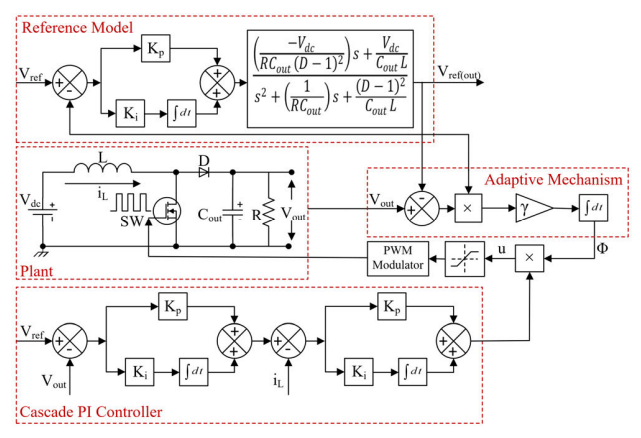Design and Cascade PI Controller-Based Robust Model Reference Adaptive Control of DC-DC Boost Converter
Objective
The main objective of this project is to track the desired signals and regulate the plant process variables in the most beneficial and optimized way without delay and overshoot.
Abstract
In this paper, Cascade PI Controller-Based Robust Model Reference Adaptive Control (MRAC) of a DC-DC boost converter is presented. Non-minimum phase behavior of the boost converter due to right half plane zero constitutes a challenge and its non-linear dynamics complicate the control process while operating in continuous conduction mode (CCM). The proposed control scheme efficiently resolved complications and challenges by using features of cascade PI control loop in combination with properties of MRAC. The accuracy of the proposed control system’s ability to track the desired signals and regulate the plant process variables in the most beneficial and optimized way without delay and overshoot is verified using MATLAB/Simulink by applying comparative analysis with single PI and cascade PI controllers.
Keywords: Cascade PI controller, control systems mathematical models, model reference adaptive control, state-space averaging method, time and frequency domain analysis.
NOTE: Without the concern of our team, please don't submit to the college. This Abstract varies based on student requirements.
Block Diagram

Specifications
Software Configuration:
Operating System : Windows 7/8/10
Application Software : Matlab/Simulink
Hardware Configuration:
RAM : 8 GB
Processor : I3 / I5(Mostly prefer)
Learning Outcomes
- Introduction to Matlab/Simulink
- What is EISPACK & LINPACK
- How to start with MATLAB
- About Matlab language
- About tools & libraries
- Application of Matlab/Simulink
- About Matlab desktop
- Features of Matlab/Simulink
- Basics on Matlab/Simulink
- Introduction to controllers.
- Study of PWM techniques.
- Project Development Skills:
- Problem analyzing skills
- Problem solving skills
- Creativity and imaginary skills
- Programming skills
- Deployment
- Testing skills
- Debugging skills
- Project presentation skills
- Thesis writing skills


 Paper Publishing
Paper Publishing
